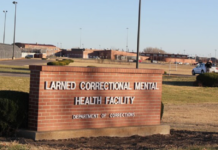Aetna late Monday responded to state concerns that its health provider network was lagging behind the other managed-care companies administering the state’s privatized Medicaid program.
The number of medical providers available through Aetna Better Health of Kansas is about two-thirds of what is available from one of the state’s other managed-care companies and not quite half of what is available from the third company, according to a June 30 report.
Aetna has 21,603 providers, compared to 35,188 for Sunflower Health Plan and 46,285 for UnitedHealthcare as of the end of June, the most recent numbers available. The numbers could include the same provider multiple times if they serve different parts of the state.
The company says it’s working to build out its network in order to meet the state’s requirements.
“We have been enhancing our provider network and believe that we now have a network that is comparable with the other managed care organizations participating in KanCare,” Aetna said in a statement.
The company added that it is working to fix reported problems.
“We are continuing to work collaboratively with the state to resolve some of the technical issues that our members and some providers have experienced to this point,” Aetna said.
Network adequacy is one of the issues the state is working on with Aetna to bring it into compliance with its contract. The state has been threatening to end the KanCare contract with Aetna unless it complies.
State health officials and company executives are set to discuss contract compliance Tuesday before the legislative committee that oversees KanCare.
The problem with the number of providers stems from a couple of issues: the state’s inability to verify the number of providers Aetna reports as well as the lengthy period of time it takes the company to credential them.
State records show that it is taking Aetna more than 90 days to credential providers, and sometimes paperwork that is needed to certify the provider is delayed.
“We are monitoring Aetna’s progress as it relates to setting up a network, and have not had sufficient data to get a true measure,” Kansas health department spokeswoman Ashley Jones-Wisner said in a statement.
A review of state records over the past several years reveals that disparity between the number of Aetna providers and the other managed-care companies’ numbers is high, even when compared to the first year of KanCare when the program was just getting up and running.
Historically, the managed-care companies each offer about 30% to 40% of the providers in the privatized Medicaid program known as KanCare.
As of June 30, Aetna’s providers only made up 21% of the KanCare market, compared to 34% for Sunflower and 45% for United.
By comparison, at the end of 2018, United had 38% of the providers available through KanCare while Amerigroup had 32% and Sunflower had 31%, records show.
After the first six months of KanCare, each managed-care company offered about a third of the providers, ranging from 29% to 38%, records show.
The disparity in the number of providers between Aetna and the other managed-care companies is greater than in the past, state records show.
This year, Atena offered 61% of the providers available through Sunflower and 47% of the providers offered by United.
At the end of last year, the company with the fewest providers still offered 80% of the number of providers available through the company with the biggest network and 97% of the company with the second-most providers.
Sean Gatewood, co-administrator of the KanCare Advocates Network, said it was surprising that Aetna has not had a more robust network so far.
He was under the impression that Aetna’s commercial network would roll over into KanCare.
“That difference is striking. No doubt about it,” Gatewood said of the number of Aetna providers. “It certainly raises a red flag and raises a lot of questions.”
















